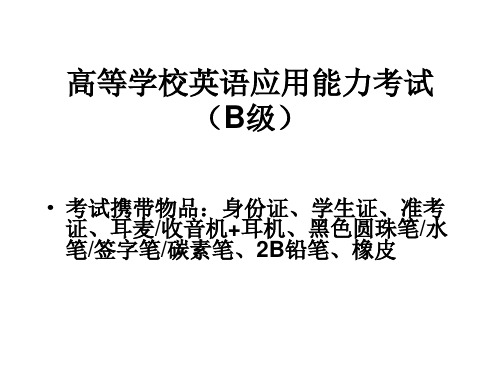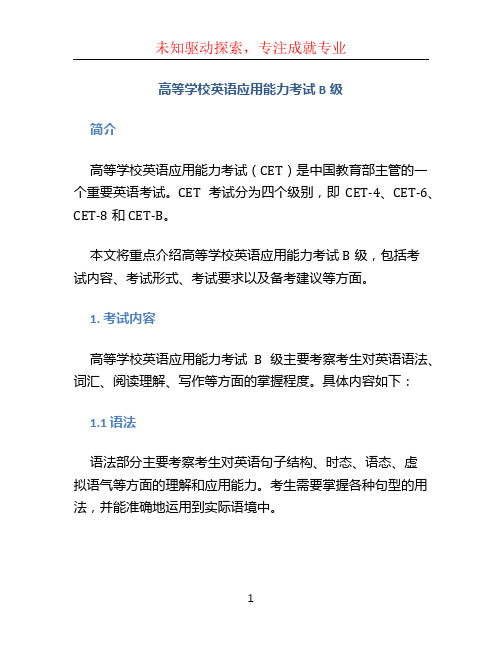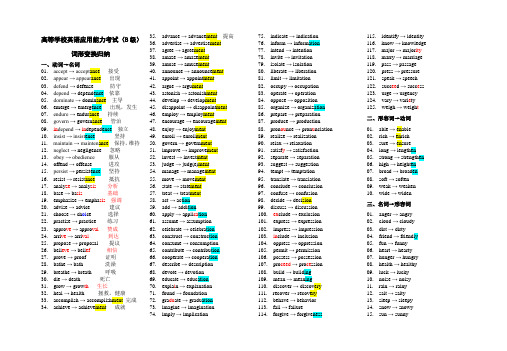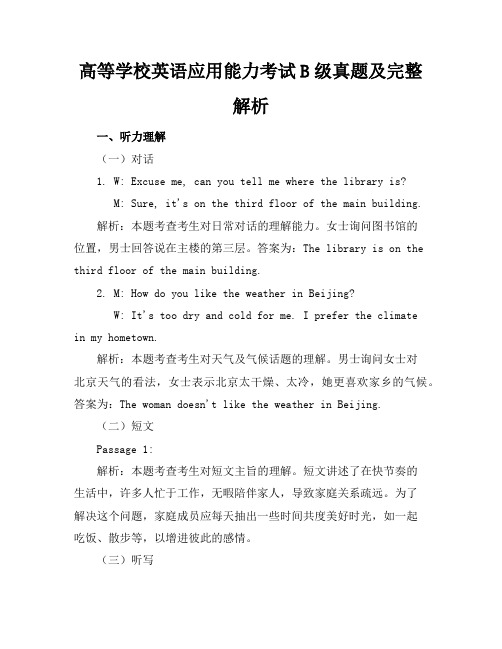高等学校英语应用能力考试B级
英语B级

• 2. 技巧点拨 • 1)听前预测 • 在听听力指令前要浏览整篇文章,了解文章内容,同时判断 所缺部分的形式。做到“有的放矢”,预测听写内容,从而 提前避免错误的发生。注意空格前的单词的属性:是be动词、 动词、形容词,还是副词、介词或动词不定式等,以决定要 填词汇的形式。 • 2)听主记辅 • 考生在听第一遍时,要大致把握文章的整体内容,在不影响 全文听音的情况下,可利用速记的方式记录关键词,切忌在 某个单词或词组上辗转徘徊,以致影响后面的文章的理解。 • 3)记主听辅 • 考生在听第二遍的时候,应该以记为主。在空格后有几秒的 停顿,此时要抓紧时间写出所缺的单词或词组。 • 4)查漏补缺 • 第三遍用于认真核对,查漏补缺。此时考生要注意单词的拼 写、名词的单复数、动词的时态和语态,还要注意单词的大 小写问题。
听力理解应试策略
• ● 力争主动,带着问题听 • 鉴于从发卷到听力考试正式开始还有几分钟 时间,考生在拿到试卷后要充分利用这段时 间迅速把听力理解中的Section A,Section B和Section C三部分的题目要求和选项快速 浏览一下,推测每道题可能给出的问题,并 且可以预测每道题的大概内容,这样在听的 时候就可以做到有的放矢。
• 3. 求职信 • 求职信是求职人向用人单位介绍自己情况 以求录用的专用性文书。它与普通的信函 没有多少区别,但它与朋友的信函又有所 不同,当然也不同于“公事公办”公文函。 写求职信时,首先,措辞要礼貌;其次, 简洁、明了、具体地说明自己的能力和条 件;最后,要明确写明自己应聘的职位并 要突出招聘者的利益,不要一味强调自己 的需要和期望。
• • • •
• • •
•
邀请信常用句型 正式邀请 (1)You are warmly invited to attend… (2)Please confirm that you will be able to attend… (3)On behalf of… I’m pleased to invited you… 非正式邀请 (1)If you have no other plan for Sunday, why not join us at the multifunctional hall? (2)How/What about coming to…
高等学校英语应用能力考试b级

高等学校英语应用能力考试B级简介高等学校英语应用能力考试(CET)是中国教育部主管的一个重要英语考试。
CET考试分为四个级别,即CET-4、CET-6、CET-8和CET-B。
本文将重点介绍高等学校英语应用能力考试B级,包括考试内容、考试形式、考试要求以及备考建议等方面。
1. 考试内容高等学校英语应用能力考试B级主要考察考生对英语语法、词汇、阅读理解、写作等方面的掌握程度。
具体内容如下:1.1 语法语法部分主要考察考生对英语句子结构、时态、语态、虚拟语气等方面的理解和应用能力。
考生需要掌握各种句型的用法,并能准确地运用到实际语境中。
1.2 词汇词汇部分主要考察考生对英语单词和短语的掌握程度。
考生需要熟练掌握常用词汇,并能在句子中正确地运用。
1.3 阅读理解阅读理解部分主要考察考生对英语文章的理解能力。
考生需要读懂给定的文章并回答相关问题,同时也需要理解文章的主旨、细节和作者观点等。
1.4 写作写作部分主要考察考生的书面表达能力。
考生需要根据所给的题目或情景,以流畅准确的英语写出逻辑清晰的短文。
2. 考试形式高等学校英语应用能力考试B级分为笔试和口试两部分。
2.1 笔试笔试包括语法、词汇、阅读理解和写作四个部分。
考试时间为120分钟。
语法和词汇部分为选择题,考生需要从给定的选项中选择正确的答案。
阅读理解部分为阅读文章并回答相关问题的形式。
写作部分要求考生根据所给的题目或情景,写一篇短文。
2.2 口试口试主要考察考生的口语交际能力。
考生需要进行面试和对话两个环节。
面试环节中,考生需要回答考官提出的问题,并进行简单的自我介绍。
对话环节中,考生需要与考官进行实际对话,模拟真实的日常场景。
3. 考试要求高等学校英语应用能力考试B级的考试要求如下:3.1 语法和词汇考生需要掌握常用的英语语法和词汇,并能正确地运用到实际语境中。
3.2 阅读理解考生需要培养良好的阅读习惯,提高阅读速度和理解能力。
3.3 写作考生需要培养良好的写作习惯,提高写作能力,并注意书写规范和语法正确性。
全国高等学校英语应用能力考试(PRETCO)(B级)考试大纲及样题

本大纲适用于修完《基本要求》所规定的全部内容的高等职业教育、普通高等专科教育、成人高等教育和本科办二级学院、独立学院各非英语专业的学生。
本考试的目的是考核考生的语言知识、语言技能和使用英语处理有关一般业务和涉外交际的基本能力,其性质是教学---水平考试。
考试方式为机试,包括六个部分:听力理解、语法结构(分为语法和词汇两部分)、阅读理解、翻译(英译汉)和写作。
考试范围为《基本要求》对A 级所规定的全部内容。
测试考生理解所听问题并做出恰当回答的能力、理解简短对话的能力和听写词语的能力。
听力材料的语速为每分钟100 词。
听力材料以日常交际和简单的业务交际内容为主。
词汇限于《基本要求》的“词汇表”中B 级2,500 词的范围,交际内容涉及《基本要求》中的“交际范围表”所列的B 级挺立的范围。
本部分的得分占总分的 15%。
测试考生运用词语和语法知识的能力。
测试范围限于《基本要求》中的“词汇表”B级(2500 词)和“语法结构表”所规定的全部内容。
本部分的得分占总分的 15%。
测试考生从书面文字材料获取信息的能力。
总阅读量约 800 词。
本部分测试的文字材料以一般性阅读材料(科普、文化、社会、常识、经贸、人物等)为主,也包括简单的应用性文字,不包括诗歌、小说、散文等文学性材料,其内容能为各专业学生所理解。
阅读材料涉及的语言技能和词汇限于《基本要求》中的“阅读技能表”中与B 级要求相应的技能范围和“词汇表”B级中2,500 词的范围;阅读材料涉及的应用性内容限于《基本要求》中“交际范围表”B级所规定的读译范围,如:便条、通知、简短信函、简明广告、简明说明书、简明规范等。
主要测试以下阅读技能:1.了解语篇和段落的主旨和大意。
2.掌握语篇中的事实和主要情节。
3.理解语篇上下文的逻辑关系。
4.了解作者的目的、态度和观点。
5.根据上下文正确理解生词的意思。
6.了解语篇的结论。
7.进行信息转换。
本部分的得分占总分的35%。
高等学校英语应用能力考试(B级)2020年12月真题(实考题)参考答案与解析

高等学校英语应用能力考试(B级)2020年12月真题答案与解析Part I Listening ComprehensionSection A1.B 【解析】选项A意为“2美元”;选项B意为“太好了”;选项C意为“三天”;选项D意为“在一楼”。
该题属于情境判断题。
“Hey,John,how was your vacation?”是典型的询问别人的感受或看法的用语,意为嘿,约翰,你的假期过得怎么样?”,选项B符合语境,为正确答案。
2.C 【解析】选项A是接受感谢的答语,意为“不用谢”; 选项B是感谢用语,意为“多谢”;选项C是电话号码“65657788”;选项D是时间,意为“明天上午”。
该题属于情境判断题。
“ Could you repeat your phone number,please?”是委婉的请求,意为“你能重复一下你的电话号码吗?”,选项C是正确答案。
3.D 【解析】选项A是见面用语,意为“见到你很高兴”;选项B是初次见面用语,意为“你好”;选项C是现在完成时疑问向的否定答语,意为“还没有”;选项D是人名,意为“格雷格・艾伦”。
该题属于情境判断题。
“ May I ask w ho is calling please?”是委婉询问,意为“请问是谁打来的电话?”,选项D符合语境,为正确答案。
4.A 【解析】选项A意为“没有,你可以坐”;选项B表示地点,意为“在那边”;选项C是感谢的答语,意为“别客气”;选项D是被征询看法或问候时的答语,意为“还不错”。
该题属于情境判断题。
“ Excuse me,is anyone sitting here?”是典型的一般疑问句,意为“不好意思,有人坐这儿吗?”,选项A符合语境,为正确答案。
5.D 【解析】选项A是感谢的答语,意为“不用谢”;选项B是提醒用语,意为“注意脚下”;选项C是别人向你要东西或借东西时的答语,意为“给你”;选项D是对请求或建议用语的肯定答语,意为“当然,让我们去喝一杯”。
高等学校英语应用能力考试B级词形变换

高等学校英语应用能力考试(B级)词形变换归纳一、动词→名词01. accept → accept ance 接受02. appear → appear ance 出现03. defend → defense 防守04. depend → dependence 依靠05. dominate → dominance 主导06. emerge → emergence 出现,发生07. endure → endurance 持续08. govern → governance 管治09. in depend → in dependence 独立10. insist → insist ence 坚持11. maintain → mainten ance 保持,维持12. neglect → negligence 忽略13. obey → obedience服从14. offend → offense 进攻15. persist → persistence 坚持16. resist → resistance 抵抗17. analy ze→ analy sis 分析18. base → ba sis 基础19. emphasize → empha sis 强调20. advise → advice 建议21. choose → ch oi ce 选择22. practise → practice 练习23. appro ve→ appro val 赞成24. arri ve→ arri val 到达25. propose → proposal 提议26. beli eve→ beli ef 相信27. prove → proof 证明28. bathe → bath 洗澡29. breathe → breath 呼吸30. die → death 死亡31. grow → grow th 生长32. heal → health 拯救,健康33. accomplish → accomplishment 完成34. achieve → achievement 成就35. advance → advancement 提高36. advertise → advertisement37. agree → agreement38. amaze → amazement39. amuse → amusement40. announce → announcement41. appoint → appointment42. argue → argument43. astonish → astonishment44. develop → development45. disappoint → disappointment46. employ → employment47. encourage → encouragement48. enjoy → enjoyment49. enroll → enrollment50. govern → government51. improve → improvement52. invest → investment53. judge → judg(e)ment54. manage → management55. move → movement56. state → statement57. treat → treatment58. act → action59. add → addition60. apply → appli ca tion61. assume → assumption62. celebrate → celebration63. construct → construction64. consume → consumption65. contribute → contribution66. cooperate → cooperation67. describe → description68. devote → devotion69. educate → education70. expla i n → explanation71. found → foundation72. gra du ate → graduation73. imagine → imagination74. imply → implication75. indicate → indication76. inform → information77. intend → intention78. invite → invitation79. isolate → isolation80. liberate → liberation81. limit → limitation82. occupy → occupation83. operate → operation84. oppose → opposition85. organize → organization86. prepare → preparation87. produce → production88. pron ou nce → pron u nciation89. realize → realization90. relax → relaxation91. satisf y→ satisfaction92. separate → separation93. suggest → suggestion94. tempt → temptation95. translate → translation96. conclude → conclusion97. confuse → confusion98. decide → decision99. discuss → discussion100. ex clude → exclusion101. express → expression102. impress → impression103. in clude → inclusion104. oppress → oppression105. permit → permission106. possess → possession107. pro ceed→ pro ce ssion108. build → building109. mean → meaning110. discover → discovery111. recover → recovery112. behave → behavior113. fail → failure114. forgive → forgiveness115. identify → identity116. know → knowledge117. major → major ity118. marry → marriage119. pass → passage120. press → pressure121. speak → speech122. succ ee d → succ e ss123. urge → urgency124. vary → vari e ty125. weigh → weigh t二、形容词→动词01. able → enable02. rich → enrich03. sure → ensure04. long → lengthen05. strong → strengthen06. high → heighten07. broad → broaden08. soft → soften09. weak → weaken10. wide → widen三、名词→形容词01. anger → angry02. cloud → cloudy03. dirt → dirty04. friend → friendly05. fun → funny06. heart → hearty07. hunger → hungry08. health → healthy09. luck → lucky10. noise → noisy11. rain → rainy12. salt → salty13. sleep → sleepy14. snow → snowy15. sun → sunny16. taste → tasty17. time → timely18. wind → windy19. worth → worth y20. beauty → beautiful21. care → careful22. colo(u)r → colo(u)rful23. dread → dreadful24. fear → fearful25. harm → harmful26. help → helpful27. joy → joyful28. law → lawful29. power → powerful30. success → successful31. thank → thankful32. use → useful33. wonder → wonderful34. youth → youthful35. anxiety → anxious36. danger → dangerous37. glory → glorious38. mountain → mountainous39. mystery → mysterious40. nerve → nervous41. poison → poisonous42. atom → atomic43. basis → basic44. class → classic / classical45. economy → econo mic / econo mical46. electron → electro nic47. history → historic / historical48. scene → scenic49. science → scientific50. accident → accidental51. benefit → beneficial52. biology → biologi cal53. chemistry → chemi cal54. digit → digital55. education → educational 56. globe → global57. habit → habitual58. industry → industrial59. logic → logical60. nation → national61. nature → natural62. occasion → occasional63. person → personal64. ration → rational65. region → regional66. season → seasonal67. society → social / soci able68. tech no lo gy→ technologi cal69. tradition → traditional70. activity → active71. effect → effective72. defense → defensive73. differen ce→ differen t74. intelligen ce→ intelligen t75. a bility→ a ble76. capability → capable77. hono(u)r → hono(u)rable78. horror → horrible79. reason → reasonable80. value → valuable81. fool → foolish82. fortune → fortunate83. wool → woolen84. amazement → amaz ing / amaz ed85. astonishment→ astonishing/astonished86. depression → depressing / depressed87. excitement → exciting / excited88. interest → interesting / interested89. surprise → surprising / surprised90. pleasure → pleasing / pleased四、形容词→名词01. active → activity02. brave → bravery03. careful → carefulness04. careless → carelessness05. cautious → caution06. cruel → cruelty07. dark → darkness08. deep → depth09. difficult → difficulty10. free → freedom11. high → height12. happy → happiness13. ill → illness14. long → length15. real → reality16. sad → sadness17. safe → safety18. strong → strength19. true → truth20. wide → width五、动词→名词(表示人)01. act → actor / actr ess02. wait → waiter / waitress03. employ → employ er / employ ee04. interview → interview er / interview ee05. train → train er / train ee06. advise → adviser07. analyze → analyst08. apply → applicant09. assist → assistant10. build → builder11. clean → cleaner12. collect → collector13. create → creator14. dance → dancer15. detect → detective16. discover → discover er17. direct → director18. drive → driver19. edit → editor20. educate → educator21. farm → farmer22. invent → inventor23. invest → investor24. learn → learner25. manage → manager26. organize → organizer27. participate → participant28. play → player29. produce → producer30. run → runner31. serve → servant32. sing → singer33. speak → speaker34. swim → swimmer35. teach → teacher36. translate → translator37. travel → traveler38. type → typist39. visit → visitor40. win → winner六、名词单、复数(特殊)01. datum → data02. medium→ media03. phenomenon → phenomena04. belief → beliefs05. chief → chiefs06. roof → roofs07. proof → proofs08. key → keys09. toy → toys10. German → German s11. hero → hero es12. Negro→ Negroes13. potato → potato es14. tomato → tomato es15. foot → f ee t16. tooth → teeth17. mouse → mice18. child→ children19. means → means20. sheep → sheep。
高等学校英语应用能力考试B级真题及完整解析

高等学校英语应用能力考试B级真题及完整解析一、听力理解(一)对话1. W: Excuse me, can you tell me where the library is?M: Sure, it's on the third floor of the main building.解析:本题考查考生对日常对话的理解能力。
女士询问图书馆的位置,男士回答说在主楼的第三层。
答案为:The library is on the third floor of the main building.2. M: How do you like the weather in Beijing?W: It's too dry and cold for me. I prefer the climatein my hometown.解析:本题考查考生对天气及气候话题的理解。
男士询问女士对北京天气的看法,女士表示北京太干燥、太冷,她更喜欢家乡的气候。
答案为:The woman doesn't like the weather in Beijing.(二)短文Passage 1:解析:本题考查考生对短文主旨的理解。
短文讲述了在快节奏的生活中,许多人忙于工作,无暇陪伴家人,导致家庭关系疏远。
为了解决这个问题,家庭成员应每天抽出一些时间共度美好时光,如一起吃饭、散步等,以增进彼此的感情。
(三)听写1. The conference will begin at 9:00 a.m. tomorrow morning.2. Please submit your report to the headteacher before Friday.3. The new policy aims to improve the quality of education in rural areas.解析:本题考查考生对听写句子的理解。
高等学校英语应用能力考试B级模拟试题

Young people often make their parents angry at their choices in clothes and hairstyles, entertainers and music. This is not their motive(动机). They feel cut off from the adult world into which they have not yet been accepted. So they create a culture and society of their own. Then,if turns out that their music or entertainers or vocabulary or clothes or hairstyles make their parents angry, this gives them extra enjoyment. They feel they are superior, at least in a small way, and that they are leaders in style and taste.
本书的编写工作得到了学院基础部和教务处领导的关心和指导,苏州大学出版社对本书的出版也给予了大力 支持,同时,在编写过程中,本书引用了一些资料,不一一标明出处,在此我们表示衷心的感谢。
由于编者水平有限,本书难免存在不足与疏漏之处,敬请专家和读者批评指正。
感谢观看
Sometimes you are resistant, and proud because you do not want your parents to agree what you do. If they agree,it looks as if you are betraying(背叛) your own age group.
高等学校英语应用能力考试b级

知识创造未来
高等学校英语应用能力考试b级
高等学校英语应用能力考试B级(College English Test Band 4,简称CET-4)是中国教育部组织的一项英语水平考试,旨在评估考生在英语听说读写等方面的综合应用能力。
该考试主要面向在校大学生,是取得学士学位的基本要求之一。
CET-4考试通常包含四个部分:听力、阅读、写作和翻译。
考试内容涵盖了各种实际应用场景,如日常生活、工作和学习等。
考试难度适中,要求考生具备基本的英语词汇量和语法知识,能够理解和运用常见的英语表达方式。
考试成绩以百分制表示,及格分数为425分(满分550分)。
取得CET-4证书可以为考生提供更多就业和升学机会,许多大学要求学生在大学期间通过CET-4考试。
准备CET-4考试需要掌握一定的英语词汇量和相关语法知识,增加听力和阅读的训练,提高写作和翻译的能力。
平时应多进行模拟考试和练习,以熟悉考试题型和提升应试能力。
总之,高等学校英语应用能力考试B级是中国大学生英语水平的基本要求之一,通过此考试可以提高英语应用能力,为就业和升学创造更多的机会。
1。
- 1、下载文档前请自行甄别文档内容的完整性,平台不提供额外的编辑、内容补充、找答案等附加服务。
- 2、"仅部分预览"的文档,不可在线预览部分如存在完整性等问题,可反馈申请退款(可完整预览的文档不适用该条件!)。
- 3、如文档侵犯您的权益,请联系客服反馈,我们会尽快为您处理(人工客服工作时间:9:00-18:30)。
2013年12月高等学校英语应用能力考试(B级)(后附答案)PartⅠListening ComprehensionDirections: This part is to test your listening ability. It consists of 3 sections.Section ADirections:This section is to test your ability to give proper responses. There are 5 recorded questions in it. After each question, there is a pause. The questions will be spoken two times. When you hear a question, you should decide on the correct answer from the 4 choices marked A), B), C) and D) given in your test paper. Then you should mark the corresponding letter on the Answer Sheet with a single line through the center.1. A) No, thank you. B) Yes. This way please.C) My pleasure. D) You’re right.2. A) OK, thank you. B) It doesn’t matter.C) It’s over there. D) No way.3. A) Here you are. B) Let’s go.C) Why not? D) Never mind.4. A) You are so nice. B) Nice to meet you.C) I’d love to. D) It’s great.5. A) No problem. B) Not at all.C) Is it true? D) Is it right?Section BDirections:This part is to test your ability to understand short dialogues. There are 5 recorded dialogues in it. After each dialogue, there is a recorded question. Both the dialogues and questions will be spoken two times. When you hear a question, you should decide on the correct answer from the 4 choices marked A), B), C) and D) given in your test paper. Then you should mark the corresponding letter on the Answer Sheet with a single line through the center.6. A) Have a drink. B) Visit a company.C) Meet a friend. D) Write a report.7. A) On television. B) Through the Internet.C) From a newspaper. D) Over the radio.8. A) It snowed heavily. B) The wind was strong.C) It rained hard. D) The wind was strong.9. A) In the city center. B) Away from the highway.C) Close to her office. D) Near the train station.10. A) The man doesn’t like the mobile phone.B) The man has bought a new mobile phone.C) The mobile phone has already been sold out.D) The mobile phone is too expensive for the man.Section CDirections: In this section you will hear a recorded short passage. The passage is printed in the test paper, but with some words or phrases missing. The passage will be read three times. During the second reading, you are required to put the missing words or phrases on the Answer Sheet in order of the numbered blanks according to what you hear. The third reading is for you to check your writing. Now the passage will begin.There are about million businesses in the UK. About 75% of British jobs are in (11) industries—hotels, restaurants, travel and shopping. These are the fastest(12)) businesses and employ over twenty million people. Most British people work a five-day week. The working week is, (13) , the longest of any country in Europe. In 1998 a new law (14) . The law says that workers do not have to work more than 48 hours a week if they don’t want to. According to the law, British employers must give their workers (15) of 24 days a year.PartⅡVocabulary $ StructureDirections: This part is to test your ability to use words and phrase correctly to construct meaningful and grammatically correct sentences. It consists of 2 sections.Section ADirections:There are 10 incomplete statements here. You are required to complete each statement by choosing the appropriate answer from the 4 choices marked A), B), C) and D). You should mark the corresponding letter on the Answer Sheet with a single line through the center.16. I ________ in touch with you as soon as I receive more details from the manager.A) am B) was C) will be D) have been17. Traveling across the country costs a lot of money, but John can ________ it.A) spend B) give C) build D) afford18. It was not until 3:00 pm ________ the secretary found the missing report.A) where B) that C) as D) while19. The police have not ________ the search even if it has lasted for a week.A) given up B) taken away C) broken in D) brought about20. I decided to ________ as a waiter in a restaurant during my summer vacation.A) serve B) turn C) take D) make21. I’m afraid we don’t have that book in stock, ________ we can order it for you.A) as B) but C) since D) for22. In this museum a guided tour ________ for you at no charge.A) being provided B) to provide C) is provided D) provides23. Generally speaking, a lot of patience is ________ to look after a sick patient.A) regarded B) decided C) agreed D) required24. Hold the money in your bank account ________ you use it for college courses.A) although B) as if C) unless D) wherever25. ________ the price of the product, you will have to pay for shipping.A) In terms of B) In addition to C) In relation to D) In spite of Section BDirections: There are also 10 in complete statements here. You should fill in each blank with the proper form of the word given in brackets. Write the word or words in the corresponding space on the Answers Sheet.26. The factory is going to make a new model of bicycle, designed (special) ________ for women.27. It is no use (try) ________ to advertise so much if you don’t know the users’ needs.28. WE are informed that the company meeting will (hold) ________ next Saturday afternoon.29. You should remember (lock) ________ the door when leaving the office.30. There is no (possible) ________ for us to get the products before the Spring Festival.31. (Realize) ________ that he had left an important document in the office, Harry ran back for it.32. Their excellent performance has left a deep (impress) ________ on the audience.33. Last month I went to Germany and (take) ________ part in the World Skills Competition.34. The interview is very (success) ________, so you will get a chance to work for the famous software company.35. (Compare) ________ with those products, ours are more reasonable in price and better in quality.PartⅢReading ComprehensionDirections: This part is to test your reading ability. There are 5 tasks for you to fulfill. You should read the reading materials carefully and do the tasks as you are instructed.Task 1Directions: After reading the following passage, you will find 5 questions or unfinished statement, numbered 36 to 40. For each question or statement there are 4 choices marked A), B), C) and D). You should make the correct choice and mark the corresponding letter on the Answer Sheet with a single line through the center.Companies sometimes receive hundreds of applications for a single job, and it is becoming more common for managers to conduct screening(筛选) interviews over the phone. This saves them considerable time and money—especially if a candidate lives out of town.Don’t take these interviews lightly. It is important to prepare for a telephone interview just as you would do foe a regular interview.The employer will normally call or e-mail you in advance to set up an interview time. If possible, arrange for the interview to be held over a landline phone(座机), as it is more reliable than a mobile phone. Make sure that children, pets and other sources of interruption will be out of the room. Keep a glass of water nearby.Phone interviews can often last a half-hour to an hour and be sure to have your resume in front of you. Do your best to be personal, but don’t overdo it by, say, trying to tell a joke.36. Screening interviews over the phone is becoming more common because ________.A) It is simple and fair B) it is easier to prepareC) it seems more friendly D) it saves time and money37. An employer usually arranges the time for the interview by ________.A) paying you a personal visit firstB) calling or e-mailing you in advanceC) announcing the date in the newspaperD) asking you to visit the company’s website38. A landline phone is preferred for the interview because it is more ________.A) reliable B) economical C) efficient D) practical39. What should you do with your resume during a phone interview?A) Keep it in front of you. B) Read it out if required.C) Post it up online. D) Send it by e-mail.40. In the last sentence, by saying “…but don’t overdo it…”, the author means “don’t be too ________”.A) nervous B) proud C) personal D) formalTask 2Directions: This task is the same as Task 1. The 5 questions or unfinished statements are numbered 41 to 45.If you’re looking for ways to improve your products or services, customers can be one of your most valuable sources of information and market research. So why not take it a step further and visit some of them?Ideally, you want to do this in person, so you may need to offer you customers something for their time. They may be pleased that you take their opinion seriously, and they may also enjoy getting a chance to help influence your products or services. If you customers are in different places, you could make such visits part of your business travel to get a wider range of responses.One expert recommends that you make your customers feel comfortable during the visits. You’re not trying to sell anything through these meetings, so plan to spend 80 percent of your time listening.Don’t try to lead your customer to give responses that you really want to hear. Instead, ask questions that focus on the customer’s experience, such as whether they got what they were hoping for and what they found difficult or enjoyable.41. According to the passage, your customers can be very helpful in ________.A) expanding your business B) reducing your production costC) selling your products or services D) improving your products or services42. In the first paragraph, the author suggested ________.A) paying a visit to some customers B) finding out sources of informationC) advertising your products or services D) carrying out various market researches43. Your customers may feel happy if you ________.A) take them as your good friends B) treat their opinions seriouslyC) offer quick responses D) visit them regularly44. According to the expert, the way to make your customers comfortable during the visit is ________.A) to promise them the best priceB) to explain your sales plan to themC) to spend most of your time listeningD) to tell them the advantages of your products45. The focus of your questions during the visit should be on ________.A) the development o your business B) responses that you want to hearC) the customer’s experience D) your future sales planTask 3Directions: Read the following passage. After reading it, you should complete the information by filling in the blanks marked 46 to 50 (in no more than 3 words) in the table below.This reminder(提示) is intended to offer guidance for using e-mail. This is not a “how-to” document, but it is rather a document that offers advice to prevent you from being cheated or troubled by e-mails.Studies show that knowledge workers spend about 20 hours a week doing e-mail and one-third of that e-mail is useless. Still worse, 70% of this e-mail gets handled within six minutes of arrival and the average worker is interrupted every three minutes. As a consequence, there is a cost to our organizations. While we can’t control what we receive from the outside, we can make some progress from the inside. Please read this paper and take action by following its instructions. Many thanks go to Earl Hacker (CIO. WBB Consulting, Inc.) for providing some of this information from an internet site.Directions:The following is a list of terms used in an Application Form forImport/Export of Articles for Personal Use (进出境自用物品申请表). After reading it, you are required to find the items equivalent to (与……等同) those given in Chinese in the table below. Then you should put the corresponding letters in brackets on the Answer Sheet, numbered 51 through 55.A—Applicant’s Name B—NationalityC—Date of Birth D—AddressE—Passport No. F—Permit No. of ArticlesG—Departure Country H—TelephoneI—Entry/ Exit Port J—Destination CountryK—Port of Loading L—Means of TransportM—Bill of Lading N—number of Piece(s)O—Port of Delivery P—Gross WeightQ—RemarksDirections: Read the following passage. After reading it, you are required to complete the answers that follow the questions (No. 56 to No. 60). You should write your answers (in no more than 3 words) on the Answer Sheet correspondingly.Dear Mr. Harrison,It was a pleasure speaking with you on the phone this afternoon. I am very happy to accept the position of Project Manager with Harrison Consultants(哈里森咨询公司). Thank you very much for the opportunity to join your team. I am excited about the possibilities for this position, and I am eager to work with your team.As we discussed in our conversation, my starting yearly salary will be $50 000. I understand that after being employed for 30 days, I will receive health and life insurance benefits. After working for Harrison Consultants for six months, I will receive one week’s paid vacation.I am prepared to start work on January 1, 2014, as you requested. If there is any paperwork I need to complete before I start work, or if you need any additional information, please contact me at (732) 294-5103.I appreciate the help your associate(合作伙伴) Mr. Ken Knox provided by recommending me for this position.Thank you.Evelyn Wauson56. What position is the letter writer going to accept?The position of __________________.57. What is the starting yearly salary for the position?It is _________________________.58. What benefits will the letter writer receive after working for 30 days?Health and ________________ benefits.59. When will the letter writer be able to have a one-week paid vacation?After working for the company for ______________.60. Who recommended the letter writer for this position?Mr. _________________.PartⅣTranslation—English into ChineseDirections: This part, numbered 61 to 65, is to test your ability to translate English into Chinese. Each of the four sentences (No. 61 to No. 64) is followed by four choices of suggested translation marked A), B), C) and D). Make the best choice and write the corresponding letter on the Answer Sheet. Write your translation of the paragraph (No. 65) in the corresponding space on the Translation/ Composition Sheet.61. You should take into account the delivery time when you plan to order our products.A) 在决定采购我们的产品时,你应该核算交货时间。
